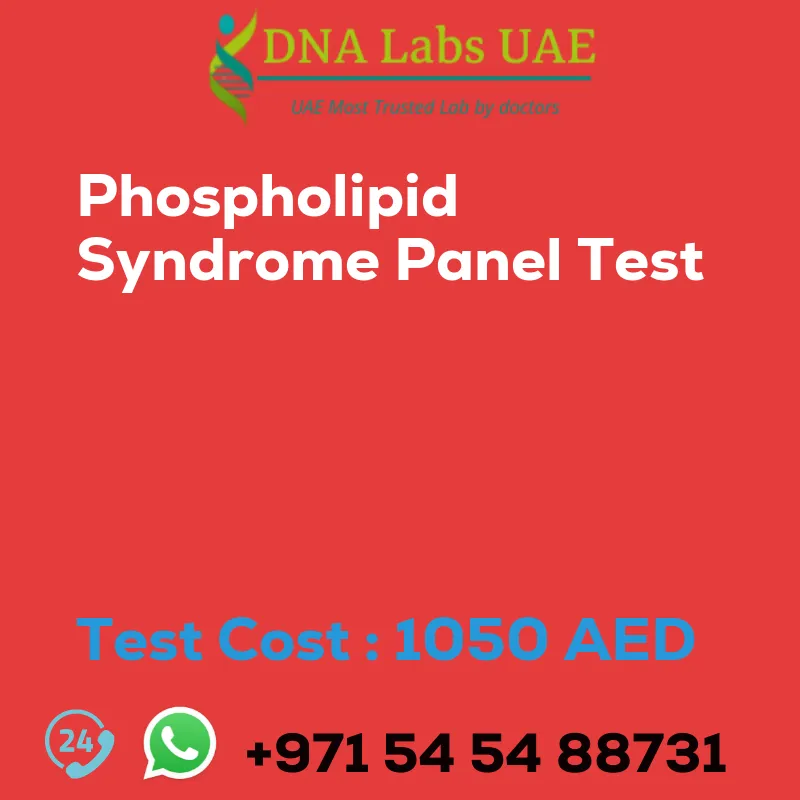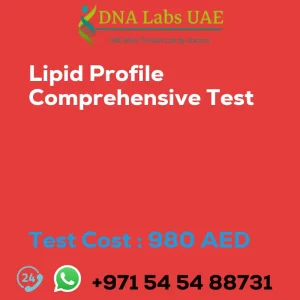PHOSPHOLIPID SYNDROME PANEL Test
The Phospholipid Syndrome Panel is a blood test that is used to diagnose and monitor patients with phospholipid syndrome, also known as antiphospholipid syndrome (APS).
APS is an autoimmune disorder that is characterized by the presence of specific antibodies that target phospholipids, which are a type of fat molecule found in cell membranes.
Test Components:
- Cardiolipin Antibodies (IgG & IgM)
- Phospholipid Antibodies Panel
- Lupus Anticoagulant by dRVVT
Test Price: 1050.0 AED
Sample Condition:
4 mL (2.5 mL min.) serum from 1 SST AND 3 mL whole blood in 1 Blue Top (Sodium Citrate) tube. Mix thoroughly by inversion. Transport to Lab within 4 hours.
If this is not possible, make PPP within 1 hour of collection as follows: Centrifuge sample at 3600 rpm for 15 min. & transfer supernatant to a clean plastic tube. Centrifuge this supernatant again at 3600 rpm for 15 min. & finally transfer the supernatant (PPP) to 1 labelled clean plastic screw-capped vial. FREEZE IMMEDIATELY. Ship frozen. DO NOT THAW.
Overnight fasting is preferred. Duly filled Coagulation Requisition Form (Form 15) is mandatory.
Report Delivery:
Sample daily by 3 pm; Report next day
Method:
EIA, Electromechanical Clot Detection
Test Type:
Thromboembolic disorders, Abortions
Doctor:
Gynecologist, Physician
Test Department:
Pre Test Information
Overnight fasting is preferred. It is recommended that the patient discontinues Heparin for 1 day and Oral Anticoagulants for 7 days prior to sampling as these drugs may affect test results. Discontinuation should be with prior consent from the treating Physician. Duly filled Coagulation Requisition Form (Form 15) is mandatory.
Test Details:
The Phospholipid Syndrome Panel is a blood test that is used to diagnose and monitor patients with phospholipid syndrome, also known as antiphospholipid syndrome (APS). APS is an autoimmune disorder that is characterized by the presence of specific antibodies that target phospholipids, which are a type of fat molecule found in cell membranes.
The panel typically includes the following tests:
- Anticardiolipin Antibodies (ACA): This test measures the levels of antibodies that target cardiolipin, a type of phospholipid found in the inner mitochondrial membrane. Elevated levels of ACA are associated with an increased risk of blood clot formation.
- Lupus Anticoagulant (LA): This test is used to detect the presence of antibodies that interfere with the normal clotting process. These antibodies can cause an increased risk of blood clotting and can also affect the results of other coagulation tests.
- Anti-Beta-2 Glycoprotein I Antibodies (anti-2GPI): This test measures the levels of antibodies that target beta-2 glycoprotein I, a protein that binds to phospholipids. Elevated levels of anti-2GPI antibodies are also associated with an increased risk of blood clot formation.
These tests are usually performed together as a panel because they provide a comprehensive assessment of the patient’s immune response to phospholipids. The results of the panel can help diagnose APS and guide treatment decisions.
It is important to note that a positive result on any of these tests does not necessarily mean that the patient has APS. Additional clinical criteria, such as a history of blood clots or pregnancy complications, are usually required for a definitive diagnosis.
| Test Name | PHOSPHOLIPID SYNDROME PANEL Test |
|---|---|
| Components | *Cardiolipin AntibodiesIgG&IgM *PhospholipidAntibodiesPanel *Lupus AnticoagulantbydRVVT |
| Price | 1050.0 AED |
| Sample Condition | 4 mL (2.5 mL min.) serum from 1 SST AND3mLwholeblood in 1 Blue Top (SodiumCitrate)tube.Mix thoroughly byinversion. Transport toLabwithin 4 hours.If this is not possible, makePPP within 1 hour of collection as follows: Centrifugesampleat3600rpmfor15 min.&transfersupernatanttoaclean plastictube. Centrifugethissupernatant again at 3600 rpm for 15 min. & finally transferthesupernatant(PPP)to1 labelled cleanplasticscrewcappedvial. FREEZE IMMEDIATELY. Ship frozen. DONOTTHAW. Overnightfastingis preferred. Duly filled Coagulation Requisition Form (Form 15) is mandatory. |
| Report Delivery | SampleDaily by 3 pm;ReportNext day |
| Method | EIA, Electromechanical Clot Detection |
| Test type | Thromboembolic disorders, Abortions |
| Doctor | Gynecologist, Physician |
| Test Department: | |
| Pre Test Information | Overnight fasting is preferred. It is recommended that patient discontinues Heparin for 1 day and Oral Anticoagulants for 7 days prior to samplingas these drugs may affect test results. Discontinuation should be with prior consent from the treating Physician. Duly filled Coagulation Requisition Form (Form 15) is mandatory. |
| Test Details | The Phospholipid Syndrome Panel is a blood test that is used to diagnose and monitor patients with phospholipid syndrome, also known as antiphospholipid syndrome (APS). APS is an autoimmune disorder that is characterized by the presence of specific antibodies that target phospholipids, which are a type of fat molecule found in cell membranes. The panel typically includes the following tests: 1. Anticardiolipin Antibodies (ACA): This test measures the levels of antibodies that target cardiolipin, a type of phospholipid found in the inner mitochondrial membrane. Elevated levels of ACA are associated with an increased risk of blood clot formation. 2. Lupus Anticoagulant (LA): This test is used to detect the presence of antibodies that interfere with the normal clotting process. These antibodies can cause an increased risk of blood clotting and can also affect the results of other coagulation tests. 3. Anti-Beta-2 Glycoprotein I Antibodies (anti-2GPI): This test measures the levels of antibodies that target beta-2 glycoprotein I, a protein that binds to phospholipids. Elevated levels of anti-2GPI antibodies are also associated with an increased risk of blood clot formation. These tests are usually performed together as a panel because they provide a comprehensive assessment of the patient’s immune response to phospholipids. The results of the panel can help diagnose APS and guide treatment decisions. It is important to note that a positive result on any of these tests does not necessarily mean that the patient has APS. Additional clinical criteria, such as a history of blood clots or pregnancy complications, are usually required for a definitive diagnosis. |







